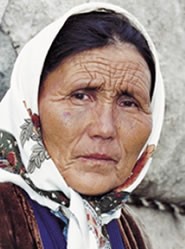Teleut, Altai in Russia

Photo Source:
Copyrighted © 2026
Operation China, Asia Harvest All rights reserved. Used with permission |
Send Joshua Project a map of this people group.
|
| People Name: | Teleut, Altai |
| Country: | Russia |
| 10/40 Window: | No |
| Population: | 2,200 |
| World Population: | 2,270 |
| Primary Language: | Altai, Southern |
| Primary Religion: | Ethnic Religions |
| Christian Adherents: | 3.00 % |
| Evangelicals: | 1.00 % |
| Scripture: | New Testament |
| Ministry Resources: | Yes |
| Jesus Film: | Yes |
| Audio Recordings: | Yes |
| People Cluster: | Ural-Siberian |
| Affinity Bloc: | Turkic Peoples |
| Progress Level: |
|
Introduction / History
The Teleut or Altai people live in the Altai Mountains of Central Asia. These mountains are located where the borders of Russia, Kazakhstan, Mongolia, and China meet. The traditional occupation of the Teleut is nomadic animal husbandry. A family's wealth was determined by its number of sheep, goats, cattle and horses. The area where the Teleut live was annexed by Russia in 1869. Russian Orthodox missionaries tried to evangelize the Teleut but had little success.
A New Testament and the JESUS Film are available in the Southern Altai language that the Teleut speak. Teleut adults are also able to speak Russian.
What Are Their Lives Like?
The Altai region is one of the most inhospitable and harsh places in all of the earth. Temperatures regularly plummet to minus 50 Celsius degrees during the long winter months to 40 degrees in the summer. Rich, virgin forests cover the slopes of steep mountains that rise over 4,000 meters (13,120 ft.) above sea level. Teleut men spend the summer months hunting and fishing to store up supplies for the winter. Women gather berries and other edible plants in the short summer. Alcoholism is common among indigenous peoples like the Teleut.
Some Teleut have settled down and no longer take care of animals. They work in Russian mines, factories and in the lumber industry. Some of these Teleut speak Russian as their first language. Some have moved away looking for a better life in Russian cities. Some urban Teleut marry outside their group and have been absorbed into the general Russian population.
If present trends continue, the Altai language that the Teleut speak may disappear in a few decades. Young people prefer to speak Russian rather than the language of their grandparents.
What Are Their Beliefs?
The Teleut have long been under pressure from the Mongols, Tuva, and Kazaks who inhabit the Altai area, to convert to Tibetan Buddhism or Islam. Some Teleut have become secular in recent decades as a result of the Soviet education.
Many Teleut still practice the shamanism and animism of their ancestors. The shaman offers spells and amulets to protect the people from evil spirits that inhabit the objects of nature. The Teleut reverence the spirits of their ancestors.
Only a tiny number of the Teleut claim to be followers of Jesus Christ.
What Are Their Needs?
The Teleut need to see the love of Christ shown to them in practical ways. Medical teams can bring modern medicine to the Teleut who practice the nomadic lifestyle. Most Teleut have never heard and clear presentation of the gospel. Christ alone can forgive their sins and free them from their fear of evil spirits.
Prayer Points
Ask the Lord to send workers to the Teleut of Siberia.
Pray that the few Christians among the Teleut would grow the faith and share the good news with their families and friends.
Ask the Lord to move the Teleut to read the New Testament.
Pray for a growing discipleship movement among the Teleut in this decade.